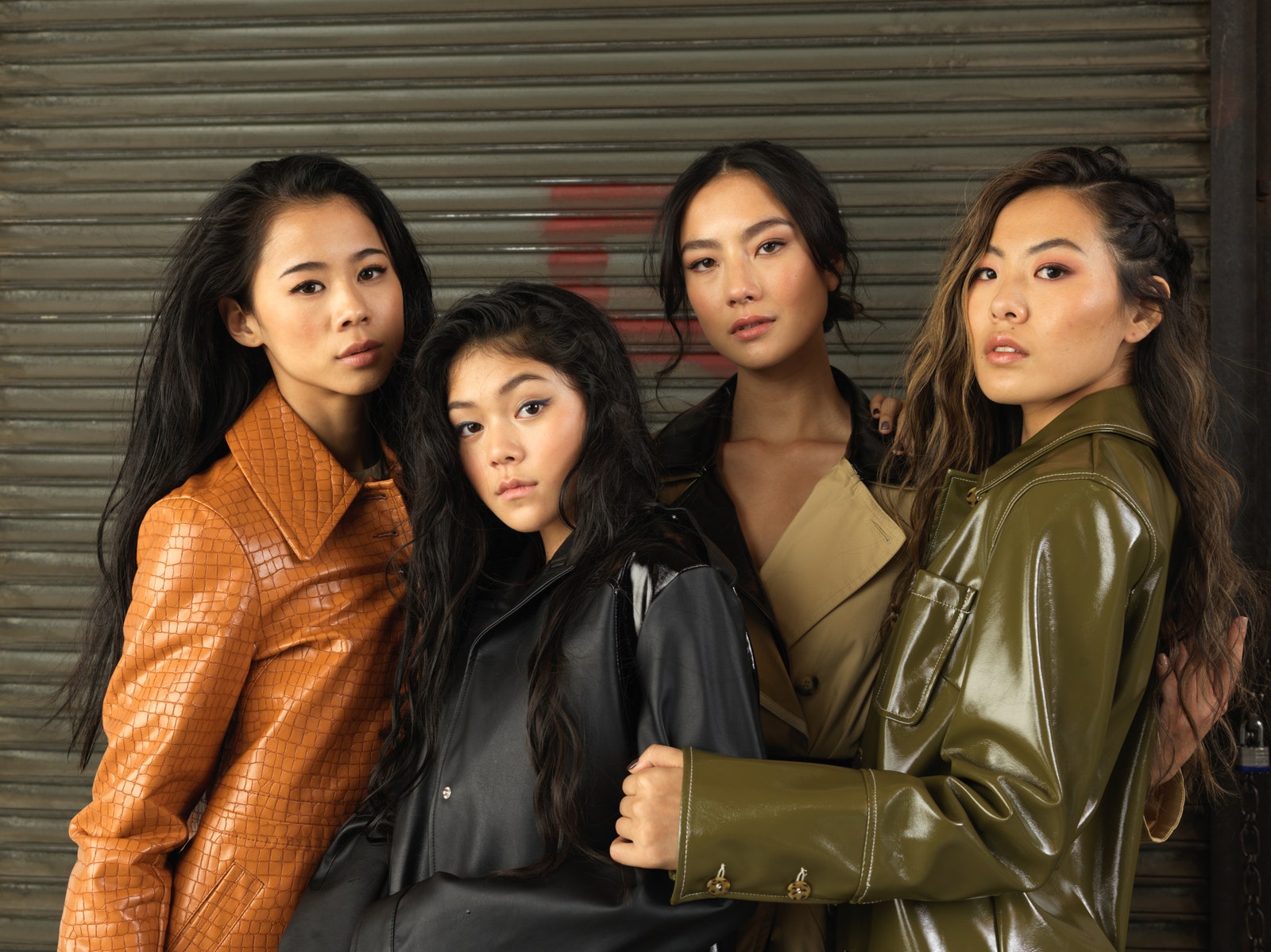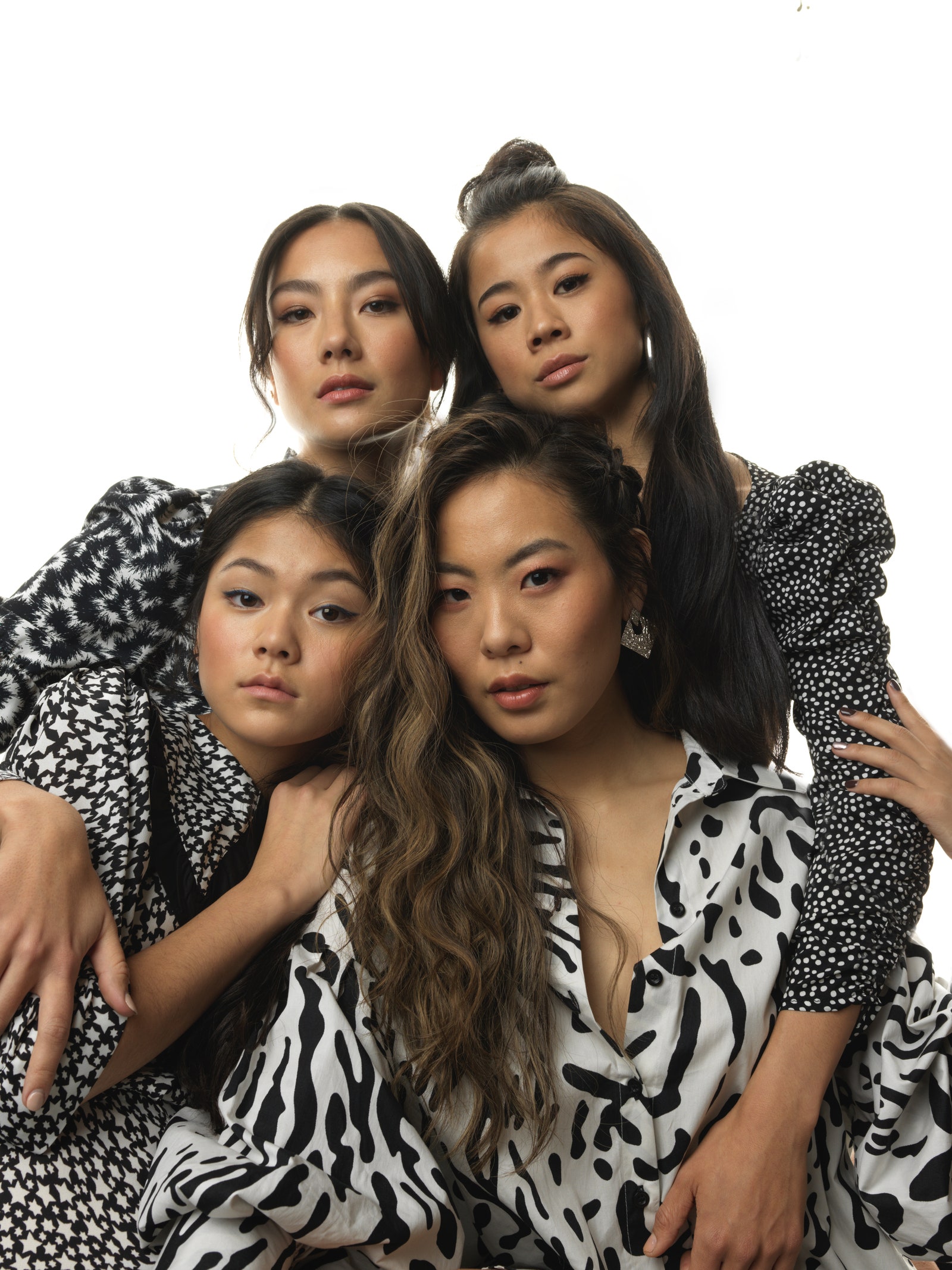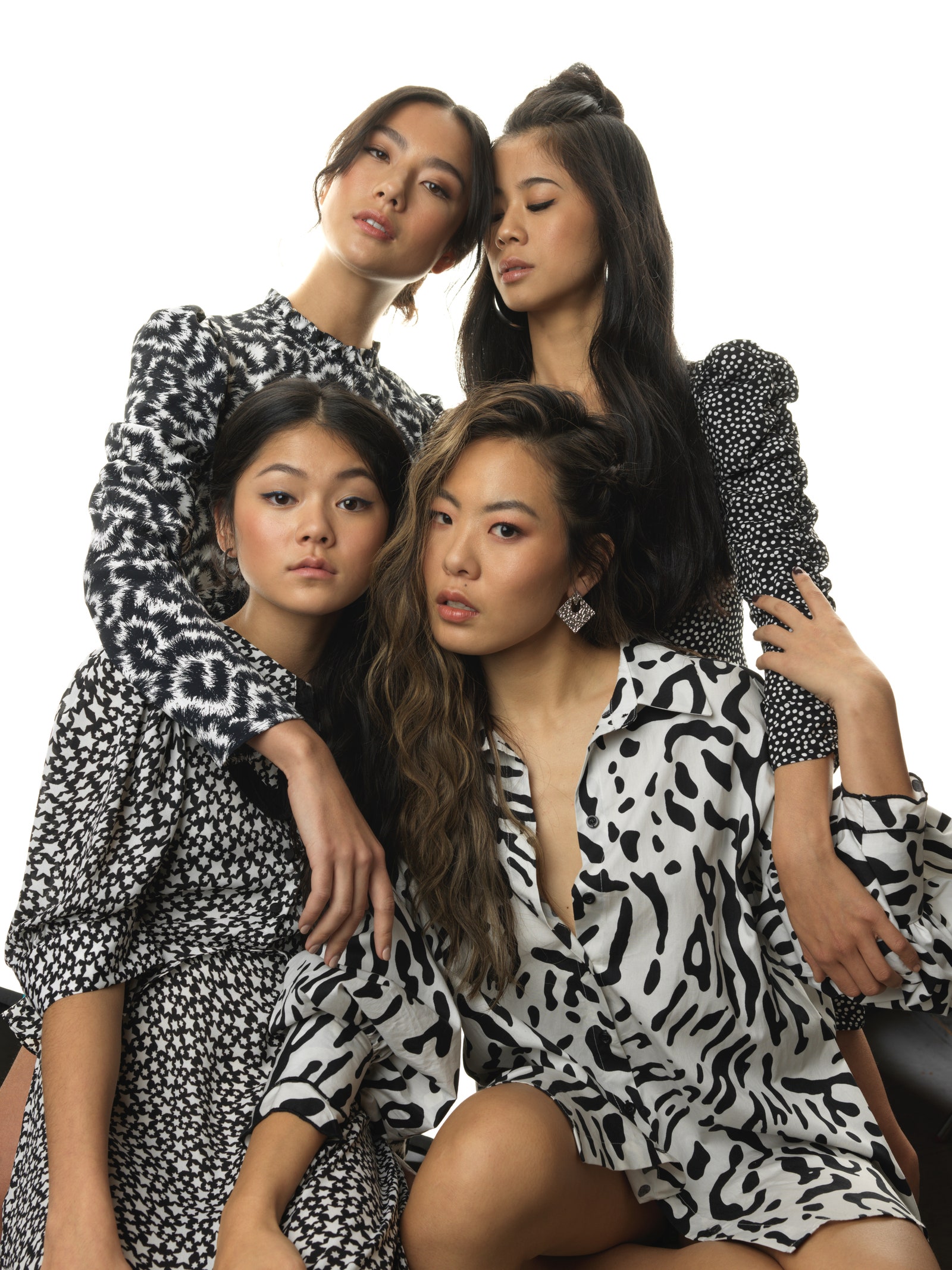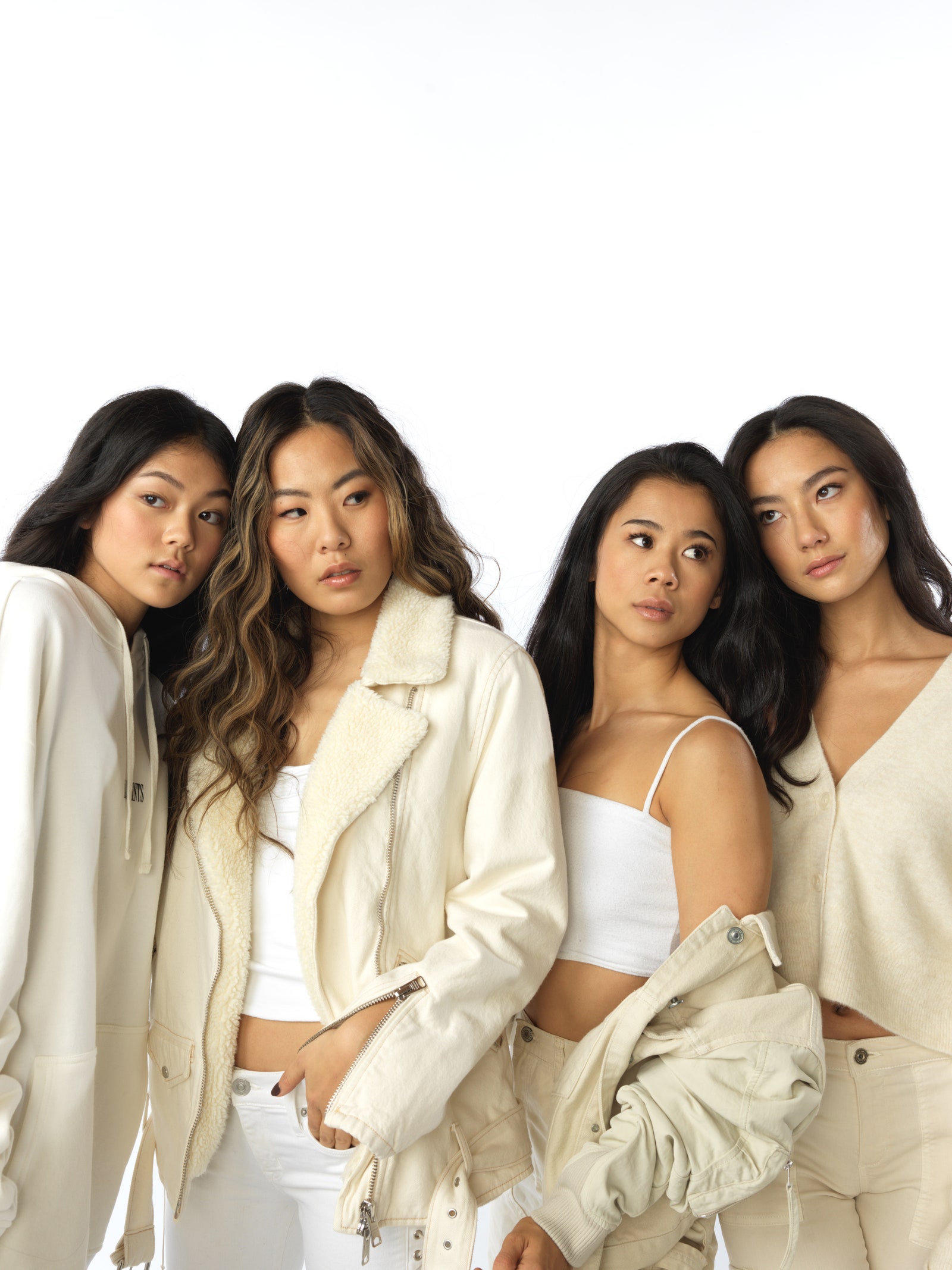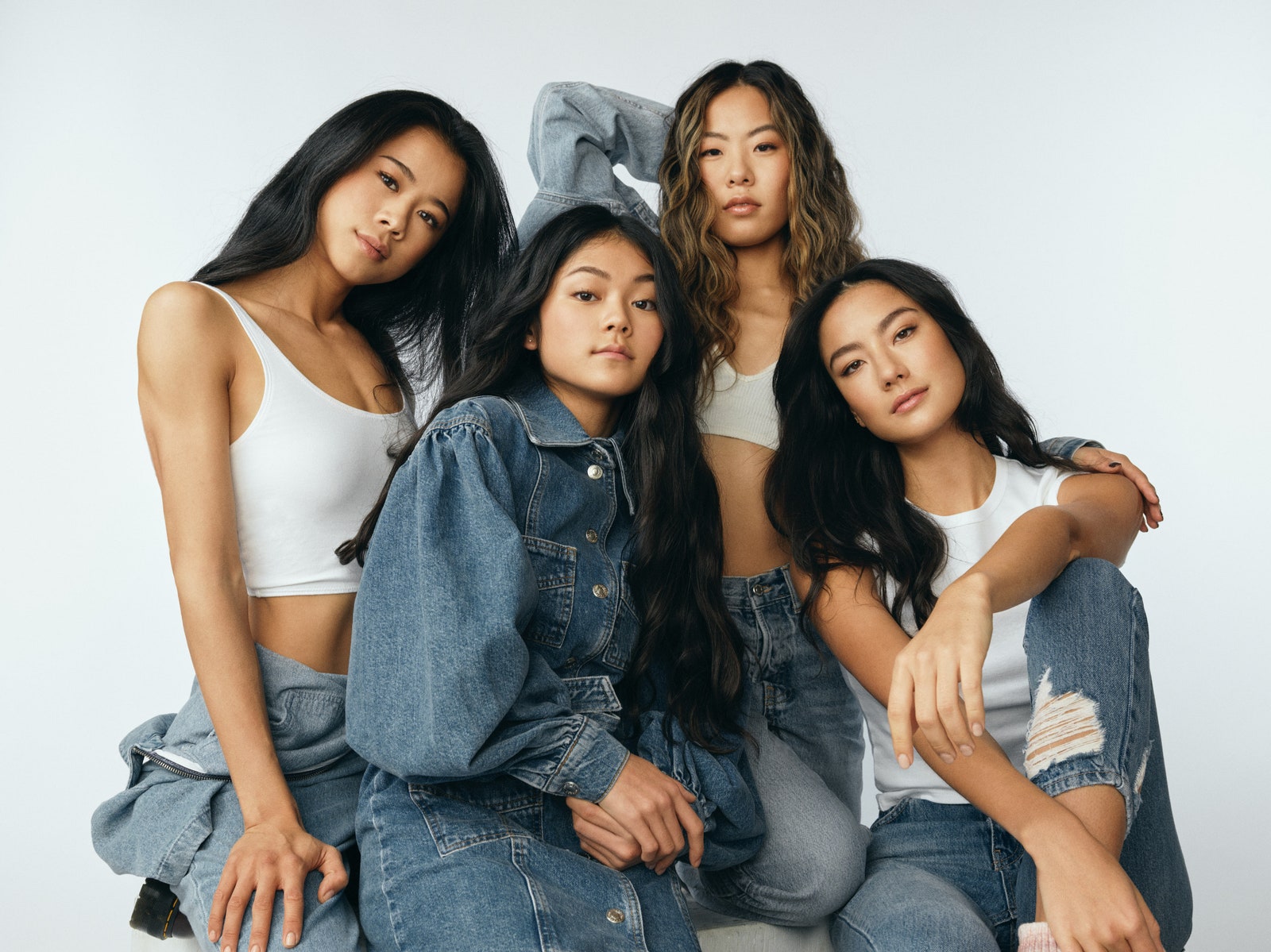Nicole Kang, Leah Lewis, Momona Tamada, and Adeline Rudolph—talented actors and close friends—came together for a roundtable discussion about the state of Asian inclusivity in Hollywood and their hopes for what's next.

On Building a Brighter Future, Together
The week after the tragic murder of six Asian American spa workers in Atlanta, I was feeling devastated, helpless, and drained. Mainstream media was slow to label the shooting as a hate crime, and many people—myself, a Korean American adoptee, included—were grappling with what it meant to be Asian in America right now. It was overwhelming, but a virtual support group with four incredible Asian women helped process and work through my emotions.
Those four women also happen to be talented actors: Nicole Kang (27, Korean American, plays Mary on Batwoman); Leah Lewis (24, adopted from China and raised in Florida, plays Georgia on Nancy Drew); Momona Tamada (14, Japanese Canadian, plays Claudia on The Baby-Sitter's Club); and Adeline Rudolph (26, German Korean, plays Minerva on Riverdale).
The actors, all close friends, were brought together for a discussion by Kang, who co-created Asian We Stand with Dash & Lily star Midori Francis. The video project sheds light on the collective racism and trauma Asian Americans have endured long before the more recent rise in anti-Asian hate after COVID-19 was labeled the “Wuhan virus.”
Leah Lewis, Momona Tamada, Adeline Rudolph, and Nicole Kang in Topshop.
Noah AsaniasOver an hour-and-a-half Zoom—ironically, they were all filming in Vancouver at the same time but couldn’t get together in person due to COVID restrictions—we shared a healing space to discuss support systems, the trauma of internalized racism, the state of inclusivity in Hollywood, journeys in embracing and rejecting their “Asian-ness,” and their hopes for the future.
Below is a transcript that has been condensed and edited for clarity, full of love and support for one another, a fair share of crying, and—most important—calls to action for how you can help the AAPI community.
Alyse Whitney: It’s incredible seeing an entire Zoom screen full of talented Asian actors. How did you all meet?
Adeline Rudolph: I met Leah through a castmate of mine, and then I met Nicole through Leah.
Leah Lewis: I actually know Nicole because we were in a casting process together. We ended up staying friends from that, and then I introduced her to Adeline. They hit it off amazingly.
Nicole Kang: Leah and I started talking at an audition and found out we would be shooting shows in Vancouver at the same time. We decided to be roommates, and that was one of the best decisions I've ever made. We have become so close since then. Momo had been connected to us through a photographer, Noah Asanias, who is Asian as well and took these gorgeous photos of us. I had been a big fan of Momo on The Baby-Sitter's Club, so I was excited to meet her.
Momona Tamada: I've looked up to these girls individually for so long, so when Noah told me we’d be doing a shoot together, I freaked out. I'm so thankful for you guys.
It seems like a fierce bond between all of you. I think, especially in a time when the AAPI community is feeling unsafe in the world, it's important to have a support system. I wanted to check in on how all of you are feeling. With the recent tragedy in Atlanta, how are you coping?
Adeline: For me, what's been interesting is that I didn't grow up in America. I grew up in Hong Kong, surrounded by a lot of Asian people. I came to the States about three and a half years ago, and it has been an interesting experience being Asian in America. It hit me hard this week. I didn't realize how much it really impacted me until I kept calling my boyfriend and would just sit there in silence. I couldn't verbalize my thoughts as I was thinking about internalized racism growing up and microaggressions. It took a toll on me.
Leah: I did grow up in America, but what was strange about digesting all this for me was seeing that some of the people who were involved in this tragedy were people who were immigrants that came over here. It was an eye-opening moment for me to really learn about that experience. When I heard the news, it took a second to process. I’d been silent for so long and internalizing everything, so that day it was really overwhelming. A lot of people were texting me, “Are you okay?” and “I'm heartbroken,” and most of them were people who are Caucasian. It was a lot to have to process and understand that our sisters, our family members, and their family members are walking down the streets feeling like they don't belong in a place they have worked so hard to be here for—and we do belong here. Having conversations about it and checking in with all my Asian sisters and other people, really opening up the door for healing and conversation, I see hope. But it will take time.
In Topshop
Noah AsaniasMomona: Because my parents are immigrants from Japan, it hit me the hardest realizing that I don't want to be scared for them to just be able to walk outside. These are the people who I hold so close to my heart. It’s great to see all the genuine support and love I’m getting from so many people, and I’m grateful for that, but it has been a lot.
Nicole: We do everything we can to be able to perform at the best of our abilities at our jobs and be the strongest we can for our families. It's mentally exhausting to find ourselves here when I feel like so many have been screaming for help all year long. I think I can speak for everyone in saying the outpouring of support and love with phone calls, DMs, comments, tweets, retweets, and shares are what I’ve been waiting for all year long. To get a phone call or a check-in was emotional because it felt like, "Thank God somebody else hears me." We can’t bring those beautiful lives back, but this is the first day of the future. It matters what we do going forward because there is no time to be wasted. To be in this group and hold each other up and celebrate all of our accomplishments is a sweet relief from the current climate.
Are you finding it difficult to distinguish between genuine allyship and performative allyship? In the age of Instagram, I see a lot of meme shares and a lot of infographics with emptiness behind it, and I've started calling people out. Have you been feeling a push and pull with your friends, or even acquaintances, who reach out and aren’t there for the right reasons?
Nicole: I think allyship is difficult to know how to get perfectly right the first time. I don't think anyone knows what to do, especially if we're talking about Asian American violence at the forefront of our news cycle. This is one of the first times, at least in my lifetime, that I can remember the word Asian American was used. This is a crazy fact I learned: It was first included as a category in the census in America in 1980. That’s only 40 years ago! So the idea that people would know how to advocate or be aware of the certain plight that pertains to Asian Americans specifically…
Also I see roundtable discussions where a member of our community is missing, and there needs to be another chair pulled to that table. If you ask me or any one of these women to join in on a conversation, that's going to do so much to amplify, integrate, and weave in our experience into this great landscape of activism that has arisen from this year. Activism starts with action. It’s performative when it's lip service with no action. Right now, I would say to my Asian brothers and sisters that survival is enough. Take care of yourselves, take care of one another, and do the best you can. For people not experiencing these levels of anxiety? Protect us. Join us hand-in-hand and pull us up, as we’ve done for so many other communities. Actions speak louder than words, always.
Leah: When no one checks on you for a really long time, it can get to a point where when they do, you kind of scratch your head, like, "Where have you been all this time?" There's a narrative, especially for Asian women, to be silent. And if we've been silent, not really expressing how hard this year is for us and how much it has affected us, sometimes people don't know. I like to give people the benefit of the doubt.
Education is everything. Social media is a wonderful tool for people to learn. At the end of the day, I don't know what people are doing after they repost their stuff. But I trust and hope that because people have access to the education, they will take action on it. It really is about showing up, having the conversations, and protecting. We can only do so much to protect people like us. It’s about people who aren’t like us who should be having these conversations.
Nicole: Culturally, we are told to behave, perform well at work, and keep our heads down. That no matter what, we shouldn’t bring in disruption and chaos. So to speak out and cause a racket, as Daniel Dae Kim recently said to Congress: “We are 23 million strong, we are united, and we are waking up.” That act of waking up is so difficult as a community because it really goes against culturally what we are taught to do. Amplify your friends' voices, reach out to your friends, and celebrate successes in each other, because I think that is the real act of rebellion.
What is your support system like, outside of Asian American friends? Are you finding that your partners and your families are having trouble processing exactly what you’re going through, because either you haven't shared it or they haven’t been through something similar?
Adeline: It’s been nice talking to my sister, who is also half German, half Korean and grew up in Hong Kong. My sister and I have never had a conversation about how we felt being Asian growing up. There's a big German expat community in Hong Kong, so we were in a very white bubble. We are half white, struggling between our two cultures. This whole week has been very tough on me because I felt like a hypocrite. I had internalized a lot.
What’s been the most difficult for me is that when I first started realizing there was this prejudice against Asian Americans because of Coronavirus, I was almost too afraid to say something because I felt like I hadn’t had it that bad. What’s the worst thing that happened to me growing up? Someone said, “Oh, you’re pretty for an Asian?” When last week hit, it was really a big realization for me: I felt ashamed of how I might have perpetuated certain things because I'd internalized a lot growing up. It's been nice having the space to have people talk it out with. I'm still working on that.
Momo, I've been watching your face as everyone else has been speaking, and I love how expressive you are as you're listening and processing. When I was 14, I was not having these types of deep, emotional conversations. The world is a lot more woke now than it was when we were teenagers; I don’t know if you’ve had some of the experiences we have yet. Can you speak to what you’ve dealt with, and the conversations you have with those close to you?
Momona: I've been told all my life that I don't look Asian enough. I’ve seen others who—and I don’t even want to say this—“look more Asian” be treated in ways I have never been. I shouldn’t be treated differently than others. In elementary school, I didn’t think it was weird to be the only Japanese Canadian girl. As I've gotten older and gone through middle school, I've seen that innocence kind of leave. You guys mentioned so much stuff that people have said to me, and I'm just realizing now that I've internalized it, taken it as a joke, or ignored it completely. Now I regret not speaking up. It really sucks that it had to come to this point where deaths had to be involved for people to really wake up. And that includes myself. We have to speak out about everything we’ve been through so we can all learn from our pasts and are no longer being silenced or made to feel ashamed by others.
It was naive of me to think you may have not endured as much because the world is a little better, or at least I thought maybe a little more educated. For the rest of the group, I would love for you to speak about your journey of being proud and loud and confident about being Asian, and the code switching and fighting stereotypes and racism you had to do along the way.
Leah: Growing up with white parents, they always reminded me that being Chinese was something incredibly special that my sisters and I should be celebrating and want to learn about. My mom put me in Chinese school and had me hang out with as many Chinese and Asian friends as possible, but I never really understood what it was like to have that culture at home. I wish I had more of that growing up. I'm still learning what it is to be Asian American. Other people who have grown up in a fully Asian family share their experiences with me, and it’s been a lot to keep my heart open to learning so much. All of me is Asian, but I grew up in a white household so it feels almost like imposter syndrome. But I am so, so proud to be Chinese. We're all getting more vocal and bold, and our voices are rising together. That’s so empowering to me.
In AllSaints
Noah AsaniasAdeline: I think for me, it was a lot about self-confidence. Growing up, my beauty ideal was blonde hair and blue eyes. Where I went to school in Hong Kong, there were a lot of beautiful mixed girls. Some of them looked more Asian, like myself, and some looked more European. There'd be moments—and I'm hesitant to say it, because it's one of those things where I realized how much I internalized it—that I wished I looked more European. Why did I think that? I thought it would make me more beautiful. That goes hand-in-hand with plastic surgery being a big thing in Korea. I have nothing against it, but the question is: Are you doing it for yourself, or because you're trying to align to a beauty standard that is not your own? I wonder if I had grown up in a world where I could have been proud of my own features and surrounded by people who loved my monolids if I would have been as proud to be Asian then as I am now. There were certain things about Korean culture that would make me say, “Mom, you need to understand, I'm German.” And my mom would reply, “But you're also Korean.” Now I’m becoming more curious about my Korean side.
Nicole: Adeline, the burden is not on you. Please forgive yourself a little bit. If we were not rewarded for how Western we were or how well-adjusted and well-adapted we were, then maybe we would have found room to find that pride earlier. But that's not the experience of a lot of us. Some of my deepest regrets are how cruel I was to my parents and having a lot of shame around how they could never do enough or perform well enough to be in a PTA group or invited out with my white friends’ parents. I grew up in Virginia. My family was really isolated, and I hated how alone I was with my thoughts. Now, having a little more perspective on how hard of a time my parents had immigrating here, I am working on forgiving myself for some of the anger. I hope that there is a young girl or a woman of any age reading this story and seeing not one but four Asian faces in Glamour and realizing she isn’t so alone in her experiences. I hope she remembers to be kind to her parents, who are struggling, too.
Momona: Growing up, my parents spoke to me in Japanese. I was completely fluent and only spoke in Japanese until I went to elementary school. I really wish I had kept it up after that. My grandmother came here before COVID, and I deeply regret that because of the language barrier I was ashamed to talk to her in Japanese. Now I'm working hard on learning more because this isn't something I want to lose.
Adeline: That is literally identical to my experience. I was, and still am, closer to my German grandparents than my Korean grandma. I could speak [Hangul], but it wasn't good enough, so it’d be very surface level talks. I couldn’t quite relate to her. I was okay with letting my Korean side go. Now, I’m not.
Representation is so important. It’s incredible that all four of you are on big TV shows where a lot of Asian kids are seeing someone who looks like them for the first time on screen. How has it been coming into a career as an Asian woman in Hollywood right now? Are you feeling that every room that you step into feels inclusive and diverse and welcoming to you? Or do you still feel that you're up against a wall?
Leah: I still do feel a little overpowered, but I'm aware that we're making progress. It’s a give and take relationship. I have been acting since I was 8 years old, and it’s always felt like there was only room for one Asian. Over the years, actually seeing roles that say “Chinese American” or “Japanese” or “Korean,” it feels like it’s actually tailored to me. It’s awesome to play a role that is made for me and not just up for grabs for everybody. Finally being able to give life to something like Ellie Chu in The Half of It was beyond my wildest dreams. It goes back to what Adeline was saying about beauty standards. The people I looked up to in pop culture growing up were always white. Seeing people that actually look like you, you feel like what you look like is normal, accepted, beautiful, and worth showing on a TV screen. Every time I see a show or get a script for something with Asian stories, it’s a pinch-me moment. I'm waiting for the day that it's not.
Adeline: I noticed that auditions were always for roles that were Caucasian or “open ethnicity.” That means white, Asian, Black, Latina, or something else. I’d walk into the room and know the white person is set; I'm competing against all other races. Why are we all competing for one spot? Black experiences are different. Asian experiences are different. Latinx experiences are different. Why are we all competing for the one best friend or sidekick? Of course it’s not for the lead. While we’ve all been focused on being diverse onscreen, we also need diversity behind the scenes in the people who write, direct, produce, and tell our stories.
Nicole: I guarantee that the four of us have had separate conversations on the shows that we are so blessed to be on, letting them know how they can more accurately depict our experience. We have to be well-read, great writers, provide options, and ultimately accept whatever decision is made—whether that's in our favor or not—for the sake of the show. It's definitely a huge honor to be on screen. It's a huge responsibility to be off of it.
Momo, I grew up reading The Baby-Sitters Club. I was never as cool as Claudia, but I aspired to be. I didn't realize back then how impactful seeing an Asian girl on the cover of a book was to me. I'd love to hear a little bit more about your experience and the reception you've gotten.
Momona: One thing I found special about Claudia is that she really steers away from stereotypes. Claudia's not good at math—not all Asians have to be smart and academic. We also see Claudia’s whole family, including her sister, and that she’s fully Japanese.
Nicole: My parents were walking around the local mall in Virginia on Halloween, and my mom sent me a picture of this little girl dressed as a doctor. She had asked her who she was, and the girl said, “Mary Hamilton from Batwoman.” [Ed Note: Mary is Nicole’s character on the show.] That moment really hit home for me. I can’t wait, Momo, for you to see people dress up as Claudia—as you—for Halloween. Having a character you’re proud of be loved by others and even imitated is a crazy experience and a gift.
Has anyone else had a memorable fan experience that stuck with you?
Leah: One of my profound moments was when I started to receive an outpour of people sharing their experiences after watching The Half of It and what they had been through growing up Asian in America. Seeing how much it means to people…it’s a beautiful responsibility. I don’t take it lightly.
Adeline: This isn't specifically a fan moment, but I think it's really nice that we're each other's fans. That's the biggest compliment. Like if I'm texting Leah, “Hey, I saw your movie. It's awesome!” We all say “I’m so glad you’re representing!” to each other. Compliments are nice coming from a stranger, but if it's coming from someone you look up to—because I look up to these girls—that's the best feeling.
In Topshop
Noah AsaniasWhat do you hope to see in the future? For the four of you, for Asian Americans, for the world?
Adeline: I hope we can all have more conversations like these and inspire future generations to have these a-ha moments. From there, we can really get to a point where we, as Asian people, can stand up for ourselves without hesitation and be fully proud of who we are and our heritage.
Momona: I hope people can feel proud and never ashamed of who they are, and have people around to support them and make sure they don’t forget how special they are.
Leah: I also hope it doesn't take another situation like this to wake everyone the eff up again! We're still fighting for our place in this world as Asians. As for these women, I hope we all get to work together—whether it's all of us together in our own show or movie or having room for more than one Asian in a project.
Nicole: Leah was just in my short film, and it was so fun getting to act with her. All three of these women are undeniable. They vary in personalities, how long they’ve been in the industry, and the breadth of who they are, but they are undeniable. I can’t wait to see what all of these women are going to do next.
Alyse Whitney is the managing editor at Cravings by Chrissy Teigen. Follow her on Instagram @alysewhitney.
Photographer: Noah Asanias; Stylist: Joanna Kulpa; Makeup: Minjee Mowat using Charlotte Tilbury; Hair: Nadia Hoecklin using Bumble and BumbleThis story originally appeared on: Glamour - Author:Alyse Whitney
